A New Papal Statement Hits—and Misses—the Mark
by Gary Gardner
Religious groups have long been players in movements to create a better world, from the anti-apartheid and civil rights movements to initiatives on arms reduction, debt forgiveness, and divestment from fossil fuels. It makes sense that they are involved in the sustainability movement as well. Sustainability, including the effort to create a steady state economy, requires a shift in one’s worldview and values, two natural domains of humanity’s diverse metaphysical systems.
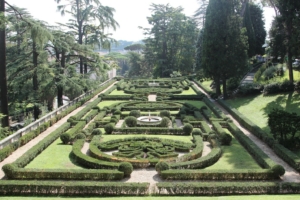
The Vatican Gardens (Wikimedia)
So I was all ears when Pope Francis released a new document last week on the climate crisis. Titled Laudate Deum, it was a follow-up to his 2015 landmark encyclical, Laudato Si’. Like the 2015 document, which was released ahead of COP 21 in Paris, Laudate Deum was timed to address an international climate conference (this time, COP 28 in Dubai in November). More than Laudato Si’ did eight years ago, Laudate Deum carries a strong sense of urgency and does not mince words. It is especially critical of the world’s powerful elites, even singling out the USA by name for direct criticism.
As a steady stater, I was pleased with Laudate Deum on some levels—while wishing for more in other areas. Let’s start with its strong points.
Wielding the Megaphone
Francis makes good use of his megaphone, addressing critical issues despite their seeming distance from the traditional terrain of papal pronouncements. Terms like greenhouse gases, degrees Celsius, parts per million, and net emissions pepper the first section of the document, occupying space more commonly claimed by theological and philosophical concerns. At one point, Francis invokes an emissions calendar of sorts, lamenting that atmospheric carbon dioxide concentrations had accelerated from 400 parts per million (ppm) when he wrote Laudato Si’ to 423 ppm just eight years later. Francis is willing to venture widely because today’s Earth-centered crises are clearly wrapped in moral, existential, and even spiritual packaging.
He speaks plainly, noting that since the Paris conference in 2015, “Our responses have not been adequate, while the world in which we live is collapsing and may be nearing the breaking point.“ His critique is equal parts consoling and damning. On one hand, he speaks up for the interests of the voiceless and powerless. “How can we forget that Africa, home to more than half of the world’s poorest people, is responsible for a minimal portion of historic emissions?”
At the same time, he fingers the guilty parties. “Regrettably, the climate crisis is not exactly a matter that interests the great economic powers, whose concern is with the greatest profit possible at minimal cost and in the shortest amount of time.” Per capita emissions in the USA, he says, are about twice the level of China and seven times greater than the average of the poorest countries. He labels the lifestyles connected with the West “irresponsible”—and you get the sense he is holding back.
The Question of Growth
In a section titled “A Growing Technocratic Paradigm,” Francis offers a multi-dimensional critique of growth, criticizing not only its ecological damage but the distorted understanding it gives of the Earth and its resources, the unequal levels of power it engenders, and ultimately, the injustice it promotes.
He starts by giving a spiritual underpinning to the problem of economic growth. Quoting from his Laudato Si’ text of eight years earlier, he writes that the “technocratic paradigm…has gone awry” because it is based on the assumption that “reality, goodness, and truth” emerge from technological and economic power. From that point, he laments, it becomes “easy to accept the idea of infinite or unlimited growth.”
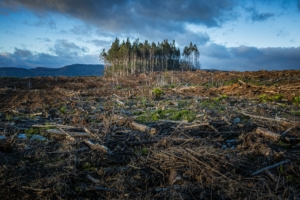
Nearing the ultimate consequence of growth (Unsplash, Matt Palmer)
Developments in recent years confirm that this view is in fact widely held, he says. “Artificial intelligence and the latest technological innovations start with the notion of a human being with no limits, whose abilities and possibilities can be infinitely expanded thanks to technology. In this way, the technocratic paradigm monstrously feeds upon itself.”
The result is an instrumental view of resources driven by an ideology that seeks to radically increase human power and convert the nonhuman dimensions of life to mere resources. “Everything that exists ceases to be a gift for which we should be thankful…and instead becomes a slave, prey to any whim of the human mind and its capacities.”
This single-minded pursuit of resources is hardly benign, Francis asserts. “It is chilling,” he writes, to realize that technology has given elites “an impressive dominance over the whole of humanity and the entire world…In whose hands does all this power lie, or will it eventually end up? It is extremely risky for a small part of humanity to have it.”
Longing for More
Inspired though I was by Francis’ critique of growth and defense of marginalized people, I wanted more from the document, perhaps unfairly, given its limited purpose in addressing the climate crisis. But I was reminded how much I valued the broad issue landscape covered in Laudato Si’ eight years earlier. Laudate Deum rightly calls for action on climate, but at this stage of our history the call needs to be broader. Climate is a symptom of a much larger problem of system design that has produced a host of interrelated problems, from biodiversity loss and ocean acidification to soil erosion and water scarcity.
These and many other symptoms of unsustainability result from economies built around an imperative of growth, incessant pressure to overconsume, and the mine-to-landfill flow of resources, to name a few notable flaws. These are themes Francis has proven skilled at critiquing. I would hope that his future writing would revisit and deepen his understanding of the need for wholesale system change.
A systems focus should be comfortable territory for Francis and his Vatican colleagues. Institutional statements on economic development from the Catholic Church are known for their broad sweep of interconnected issues, with “integral” a regularly featured term. When the galloping growth of the 1960s raised hope for the prospects of developing nations, Pope Paul called for an “integral human development” that was concerned not just with per capita income, but also the social, cultural, and spiritual dimensions of wellbeing.
Later documents continued the theme, including Francis’ use of the term “integral ecology” in Laudato Si’, which sought to ensure that ecological concerns are addressed in concert with social, cultural, and other concerns. His appeal to hear “the cry of the Earth and the cry of the poor” is a good example of this synthesis. From my reading, the “integral” approach adopted in such documents is a close cousin of systems thinking.
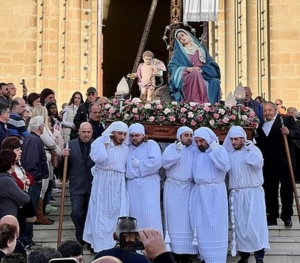
Let’s talk about carrying capacity. (Wikimedia, SebastianSaid28)
At the same time, a large piece of yet-to-be-integrated thinking in Laudate Deum and other Catholic documents dealing with development is a comprehensive discussion of population. Catholic documents can be relied on—and should be credited for—speaking up in defense of marginalized peoples and ensuring that population discussions do not become lightly veiled opportunities to bash poor communities of color in the Global South. Catholic leaders make this point regularly. They also rightly point to excessive consumption in wealthy nations as a major cause of environmental destruction. But these arguments do not cover the entire range of population questions. Carrying capacity matters, too.
At a minimum it would help for Church figures to acknowledge the raw truth that population impacts the environment. Read the Laudate Deum section critiquing growth (“The Growing Technological Paradigm”) and substitute “population” for “economy.” Francis’ argument would be equally compelling because the logic is equally strong: The economy can’t grow forever on a finite planet, and neither can population. An integral approach to development ought to include this irrefutable truth. There’s plenty of room to discuss what policies should emerge from this truth, but the fact that the size of the human family impacts the environment, as laid out in the I=PAT equation, should be a point of common agreement.
Stepping It Up
One reason I have hope for religious involvement in sustainability issues is that faith and indigenous groups can speak credibly on the key issue of exercising restraint and drawing boundaries around human activities. The idea of establishing limits is strongly resisted in our all-out, pedal-to-the-metal capitalist growth society. In principle, religions have a great deal to offer, given their rich collection of scriptural teachings, moral injunctions, and inspirational histories dealing with boundaries and restraint.
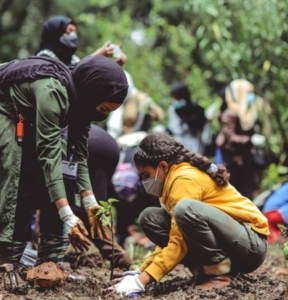
The world’s faiths can help plant sustainable economies. (Unsplash: eyoel_kahssay_photographer)
To be clear, religious people (I am one) are not necessarily more likely to live any more simply or within ecological limits than other people, especially in the USA. But the same moral imagination that lent a strong hand to the civil rights and disarmament movements can be brought to bear in reshaping economies. Organizations like GreenFaith, the Coalition on the Environment and Jewish Life (COEJL), Green Muslims, Catholic Climate Covenant, and the Laudato Si’ Movement are already leaders on the environmental front and could easily take the lead in reshaping economies as well, as a natural extension of their work.
Pope Francis is inspiring in his willingness to confront hard truths. At the same time, he could go further in diagnosing the full range of causes of the global sustainability challenge. He, and the world’s religions overall, have their work cut out for them in persuading their followers—who account for 84 percent of the global population—to get on board with the urgent work ahead.
Gary Gardner is the Managing Editor at CASSE.

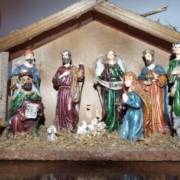

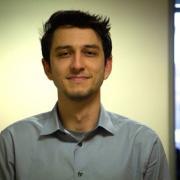

Ah, it’s almost as if the Pope has a mental block against looking the root causes in the eye. Economic growth and especially population growth. If Pope Francis were a student in a math class, I’d be trying to get him to that one last step in solving the equation … come on Francis, you’re 90% done, just one more simplification and you’ve got it!
I will just try to be hopeful that someday the Vatican will make the required mental leap to get the correct solution to the problem set.
Thanks, Cole. Yes, he was a chemistry student so is comfortable with science…
Gary you mention these groups ….’Organizations like GreenFaith, the Coalition on the Environment and Jewish Life (COEJL), Green Muslims, the Laudato Si’ Movement are already leaders on the environmental front and could easily take the lead in reshaping economies as well, as a natural extension of their work.’
Given the current horrendous backdrop in the middle east the environmental problem may provide a common existential threat to all. In the face of this lies an opportunity for faith groups to come together working to further the cause of planetary protection. It is by cooperating, addressing such a common aim, working together spilling sweat, not blood, that peace can be found.
Thanks, Conor. We can only hope that the silver lining of the climate and other existential crises is that it shakes us all awake to the common threat before us. I have wondered when the US and China would find common cause to build sustainable economies, but little sign of that so far. I am an incurable optimist, however, and international relations seems to be a realm in which unexpected turnarounds can occur. Fingers crossed on that front.
Two points on this superb article. First, I think the Pope does well in avoiding the population issue. He would have a “holy” mess on his hands in being forced to defend some of the least popular Church positions that relate to population. That might sidetrack the audience from the essential vision of his words. Second, the Pope’s message needs to resonate in the context of congressional districts where voters are bamboozled into being climate deniers, in the name of the gospel of prosperity. Finally, in Gary’s first paragraph, he refers to five different types of movements where religious groups have played a role to create a better world. I would add one more: labor. Years ago I was a volunteer with the United Farm Workers, led by César Chávez, which ended up improving the lives of working people even beyond the farm workers.
Thanks, Mark. You seem to intuit well the Church politics that likely color the Pope’s handling of the population question. It’s just that on such a big issue it seems to me unhelpful–including to the Church’s reputation–to essentially treat population as a non-issue. It would not be a heavy lift, it seems to me, to acknowledge that the size of the global population is a factor in environmental impact while also pointing to overconsumption among wealthy nations and taking a vigorous position in defending against racist attacks on marginalized peoples. That three-legged position, it seems to me, encompasses a fuller truth about population and development than the two-part response (overconsumption and racism) often championed by Church authorities. But I may not have as full an understanding of the politics involved as you!
Oh, and thanks for adding labor to the list, and for your work with the UFW!
Excellent article, Gary! Thank you for bringing the Pope’s latest writings to my attention.
A few months ago, I approached my rabbi, who is also involved in Interfaith People and Light (IPL), with the idea of starting a support group for members of the congregation who are struggling with our planetary predicament. He agreed, and a new program we are calling Green Torah was born. Last Sunday, he and I co-conducted the first session ever. We had 6 people in person and 3 on zoom. A handful of others have told me that they couldn’t make this session but will attend in November.
We started with chanting, prayers, introductions, and sharing/unburdening. The rabbi conducted these, and they gave everyone a grounding to be receptive to learning more. Then I gave a 20 minute interactive talk about embracing uncertainty, which the rabbi followed with a wrap-up.
Each month, my section will cover another drop of Green Torah, piecing together the picture like a jigsaw puzzle. As people become regulars, introductions can fall away and my interactive presentations can go longer, perhaps up to half an hour. By “interactive” I mean time for questions and group discussion. The hope is that we will all become teachers and that, together, we will come up with ideas for action, as we all gain greater systems clarity.
Peace.
Thank you, Robin, and kudos to you for your organizing efforts! I suspect the group will grow as our current crisis becomes more evident to all and will become a helpful resource for many. Thank you for your leadership in making this happen!
Robin it’s generous that you signed off with the poweful word peace. Such gestures make up the butterfly effect.